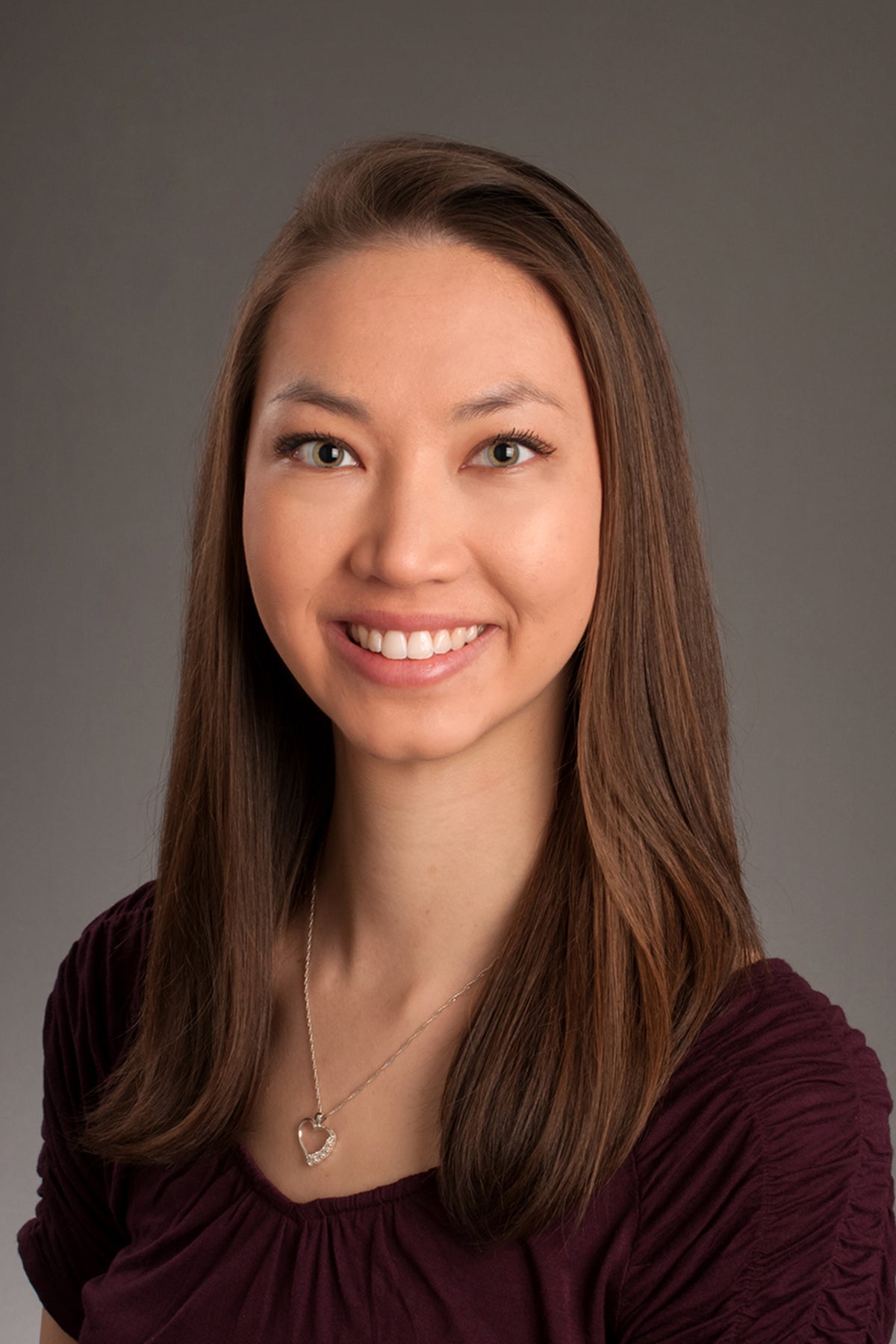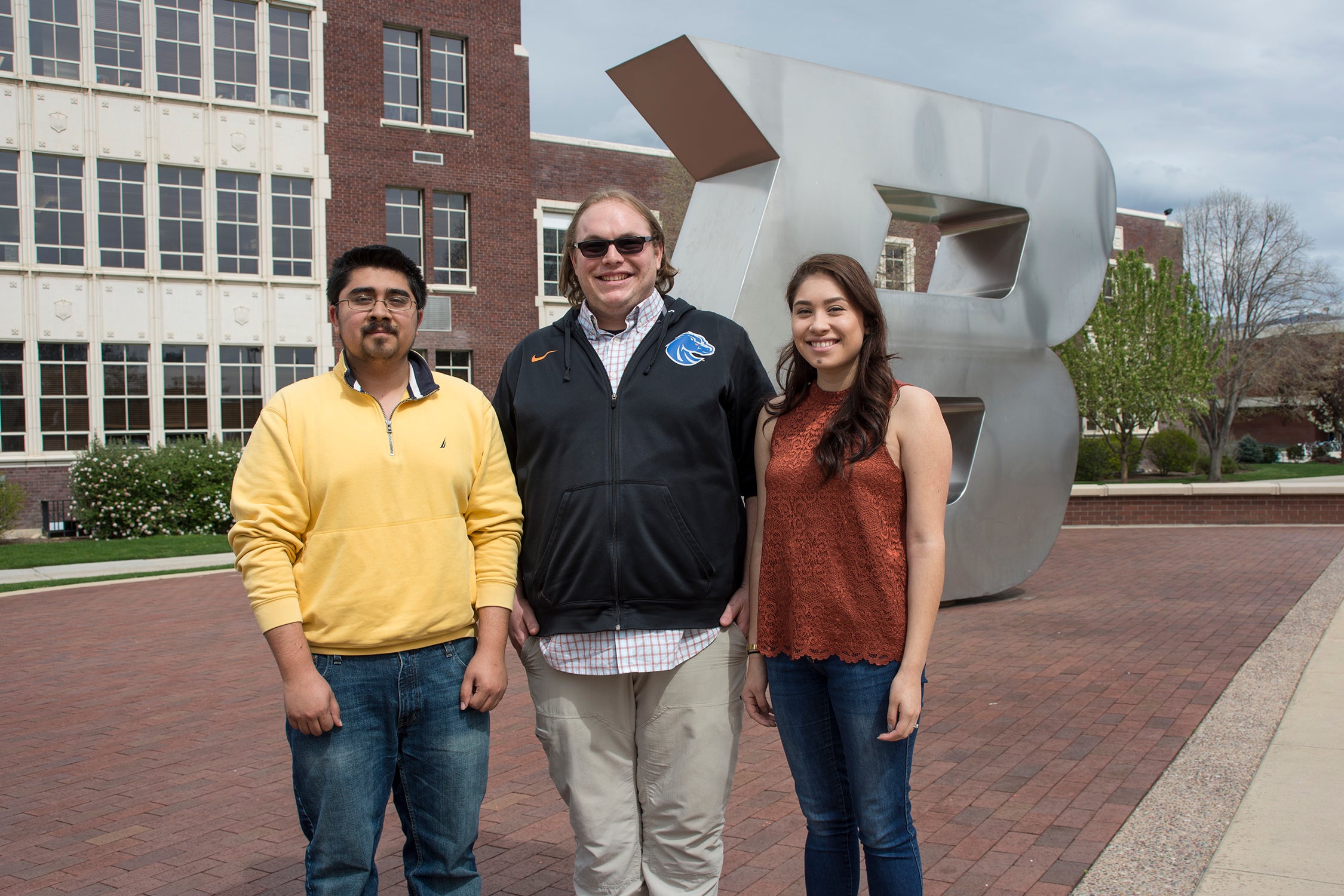The NSF received more than 12,000 applications for the 2018 competition and only selected 2,000 students nationally to receive a graduate fellowship. Another 1,459 individuals received honorable mention recognitions. The GRFP is open to undergraduate juniors and seniors who wish to pursue graduate research in the science, technology, engineering and mathematics fields.
Boise State winners include geosciences student Travis Lewis Steiner-Leach, materials engineering student Alondra B. Perez, biomedical engineering graduate student Katherine Hollar, and materials theory student Andres Correa Hernandez. Honorable mentions included electronic materials student Riccardo Torsi and biophysics student Anh Huynh.
As the oldest graduate fellowship of its kind, the GRFP recognizes and supports outstanding graduate students in NSF-supported STEM disciplines who are pursuing research-based master’s and doctoral degrees in the U.S. Fellows receive a three-year annual stipend of $34,000 along with a $12,000 cost of education allowance for tuition and fees, opportunities for international research and professional development, and the freedom to conduct their own research at any accredited U.S. institution of graduate education they choose.

Katherine Hollar
“Receiving this fellowship will allow me to continue to investigate an area of biomedical research that has never before been explored,” explained Hollar, a first-year graduate student pursuing a master’s in mechanical engineering and a doctoral degree in materials science and engineering at Boise State.
Hollar has been conducting research at the Northwest Tissues Lab under the guidance of her mentor Trevor Lujan, an assistant professor of mechanical and biomedical engineering. She is working on understanding the wear mechanisms of knee meniscus degeneration in order to prevent and treat pathologies related to the disease. Hollar credits Lujan’s mentorship in helping shape her success as a researcher and GRFP fellow.
“Since joining [Lujan’s] lab three years ago, I have been given the opportunity to actively lead and witness biomedical engineering projects being used to make significant field and societal contributions. I truly appreciate all the support and advice Dr. Lujan has generously provided me over the years.”
Notably, Boise State’s three additional fellowship winners all are part of the campus’s McNair Scholars Program, a two-year, federally funded program housed in the College of Education and designed to prepare first-generation, low income and underrepresented students for successful graduate studies.

From left: Andres Correa Hernandez, Travis Steiner-Leach, Alondra Perez
“The rigor of the program provides a great training for them to delve into a scholarship such as the NSF-GRFP because the skill set needed to do this well is similar to work they are doing in McNair preparing for graduate school,” explained Gregory Martinez, director of the McNair Scholars Program and director of Boise State’s Center for Multicultural and Education Opportunities. “I believe that the successes of our students receiving awards such as the GRFP, getting admitted sometimes to multiple graduate programs, or receiving Top Ten Scholar honors illustrates the deep passion toward learning that scholars brings to the program. In that passion they demonstrate a deep commitment and a willingness to struggle and sacrifice through their work. All of these are strengths.”
“Without the support of the McNair Scholars Program, I am not sure if I would have had the courage to apply to the NSF award,” said Perez, a senior mechanical engineering student. “The program’s guidance and support has allowed me to venture out of my comfort zone and feel supported in applying to such a prestigious fellowship.”
Perez has been working under the guidance of assistant materials science professors David Estrada and Elton Graugnard to create an electrical thermometry platform to measure thermal transport properties of heat flow across one-dimensional interfaces in two-dimensional material heterostructures.
“It is an honor to receive such a prestigious award … it will give me the academic freedom to flexibly choose the research project of my choice,” Perez said.
Perez will be using her GRFP fellowship to attend the University of California, Berkeley, and study nano-to-macroscale thermal energy processes in the areas of lithium batteries and thermoelectrics.
She added: “I would like to thank Sarah Ritter from the McNair Scholars Program and my research advisors, Dr. David Estrada and Dr. Elton Graugnard, for encouraging me to apply and supporting me throughout the application process.”
Fellow McNair scholar Steiner-Leach had similar praise for Boise State’s McNair Scholars Program in making him a competitive applicant for the GRFP.
“Service to your community is a very important part of being a McNair Scholar, and I was given the opportunity to do some really fun and exciting outreach as a part of the Boise State Micro-gravity Research Team and the geoscience club,” he said. “In particular, the outreach experience gained from being a McNair Scholar gave me a great track record of service, particularly K-12 outreach, that is important to the NSF. The NSF is funding the scientist, and not the project, so it is critical to demonstrate your commitment to making sure that STEM, and higher education, are accessible to everyone and not just those students that can afford to go to the best universities.”
Steiner-Leach, a senior studying geosciences with a geology emphasis, had the opportunity to travel to South Africa last summer to participate in fieldwork measuring the multiple sulfur isotope signature of the geological formation, Bushveld Igneous Complex. At Boise State, Steiner-Leach also has looked at the temperature-time histories of lower crustal xenoliths from South Africa, under the guidance of his mentor, geosciences professor Mark Schmitz.
Now, thanks to the GFRP, Steiner-Leach is deciding between four highly competitive doctoral research programs.
“The NSF GRFP Fellowship now gives me the flexibility to make my decision based on the mentor and project, rather than by who has funding,” Steiner-Leach said. “This is an incredible opportunity to really get some good research done and published while in my graduate program.”
Senior materials science and engineering student, and fellow McNair Scholar, Hernandez will be using his GRFP fellowship to attend an electrical engineering doctoral program at Princeton University.
“With the help of the fellowship, I now have four years of full funding at Princeton,” he said.
Hernandez spent his Boise State undergraduate career applying ab-initio methods through computational codes to model material systems and their properties, under the mentorship of Boise State assistant materials science and engineering professor Lan Li and Eric Cockayne from the National Institute of Standards and Technology.
As the oldest graduate fellowship of its kind, the GRFP has a long history of selecting recipients who achieve high levels of success in their future academic and professional careers. The reputation of the GRFP follows recipients and often helps them become life-long leaders that contribute significantly to both scientific innovation and teaching. Past fellows include numerous Nobel Prize winners, U.S. Secretary of Energy Steven Chu, Google founder Sergey Brin and “Freakonomics” co-author Steven Levitt.
BY: CIENNA MADRID PUBLISHED 3:25 PM / APRIL 17, 2018